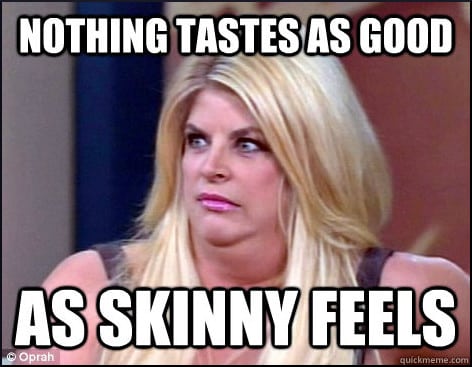
As Dr. Pretlow points out, “The quandary is, when emotional eaters realize what they are doing, they still are not able to stop… In the moment the ramifications don’t seem to have an effect…”
Many people believe that they really can’t control their actions, even the self-harming ones. In this area of the human psyche, the ruling principle seems to be cognitive dissonance — the ability to hold onto two opposing beliefs at the same time.
For instance, a juror might be absolutely certain that a rapist or murderer could have stopped himself (or herself), and that juror might righteously vote for a life sentence or the death penalty, based on a certainty that the criminal only needed to “just say no” to the violent impulse. “It’s that simple,” the juror might say. “No matter how much you feel like doing it, no matter how much you want to do it, you don’t rape and you don’t kill.”
So far, so good. But what if that juror stops at a store on the way home, and later scarfs down a quart of ice cream? Where is the certainty now? No voice is saying, “No matter how much you feel like doing it, no matter how much you want to do it, you don’t buy ice cream.”
No voice says, “You don’t have to do this. You can choose not to eat the ice cream.” That voice is silent. Only a short time ago, a person believed that it is possible to resist the impulse to kill. Now, the same person is overwhelmed by the desire to devour a quart of ice cream. How is this contradiction possible?
The wants and the shoulds
The short answer is, nobody knows. Questions about volition and choice may never be definitively answered. Researchers have come at the issue of human motivation from a lot of different angles. Katherine L. Milkman, Ph.D., associate professor at the University of Pennsylvania, has written extensively about want options versus should options and why people choose one or the other. In one paper, she attempted to reconcile the decision-making process with what has been discovered about “ego depletion.”
According to one theory, self-control is like a muscle — but not in the way we might intuitively take that to mean. Probably most people would think self-control is compared to a muscle because it can be strengthened and made larger with repeated exercise. Many of us have been taught that willpower improves with practice.
For instance, when tempted by junk food, we should just remember, “Nothing tastes as good as being thin feels.” (The picture on this page, by the way, is an anonymous Internet meme based on a photo of entertainment figure Kirstie Alley, subject of previous posts.)
Surprise: The concept of ego depletion is the exact opposite. Prof. Milkman writes:
“According to this theory, after an individual makes one attempt to engage in self-control, subsequent attempts are less likely to be successful. More specifically, ‘self-control strength is used and consumed any time the self actively initiates, alters, or stifles a response’ (Muraven and Baumeister, 2000, p. 249), and such use is ‘ego-depleting’, reducing one’s capacity for subsequent exertions of self-control.
The empirical support for this model of self-control as a limited resource is extensive.
In other words, willpower is not a muscle that grows with exercise, but a muscle that becomes feeble, flabby, and worn out with use; and a lot of research backs up that assertion. How does this discouraging news stack up against the concept of “mindfulness” as a pathway to healthful eating? Childhood Obesity News will examine that more deeply.
Your responses and feedback are welcome!
Source: “Unsure What the Future Will Bring? You May Overindulge: Uncertainty Increases the Appeal of Wants over Shoulds,” UPenn.edu, 7/19/2012
Image: Anonymous Internet meme

 FAQs and Media Requests:
FAQs and Media Requests: 











